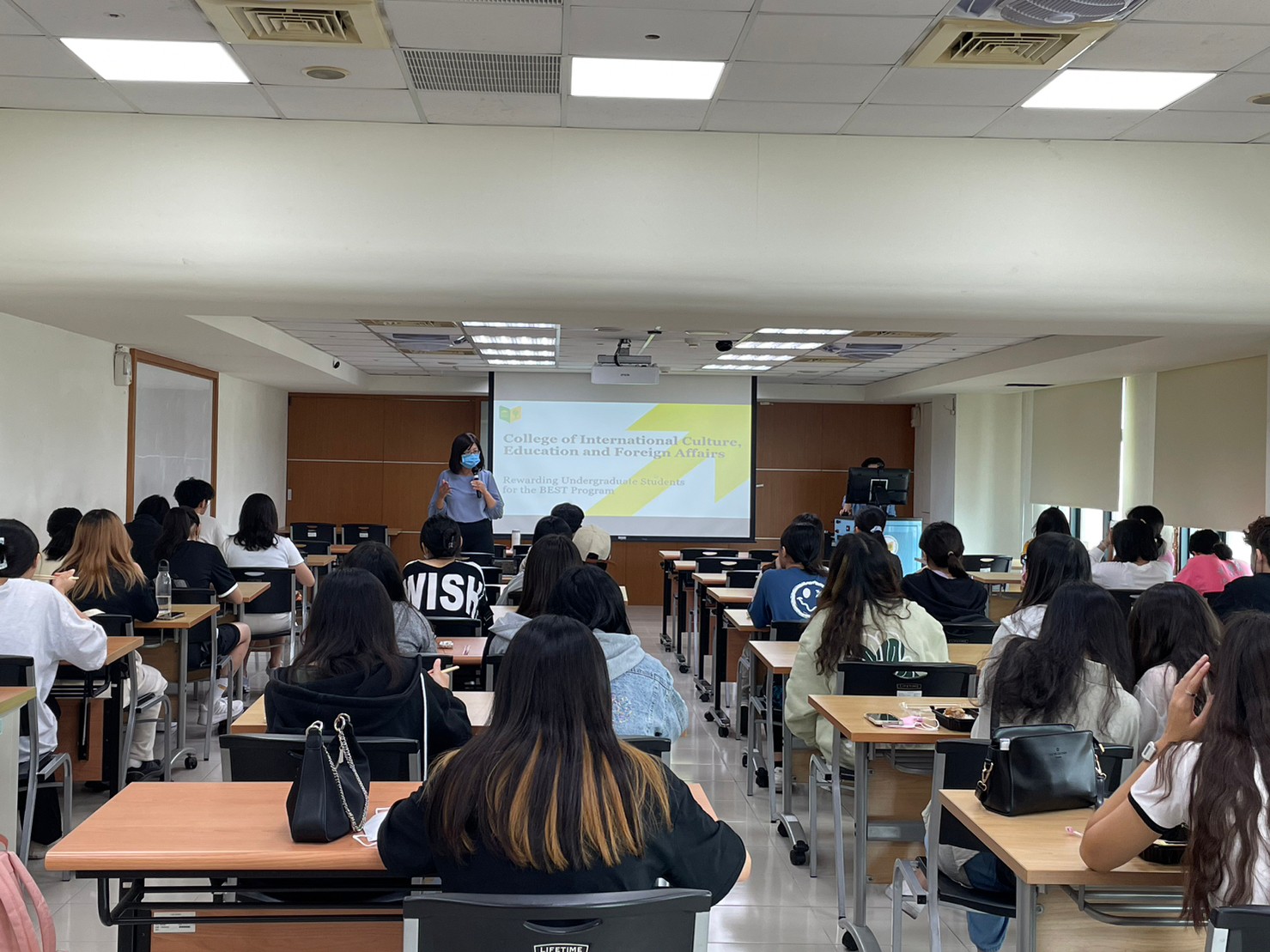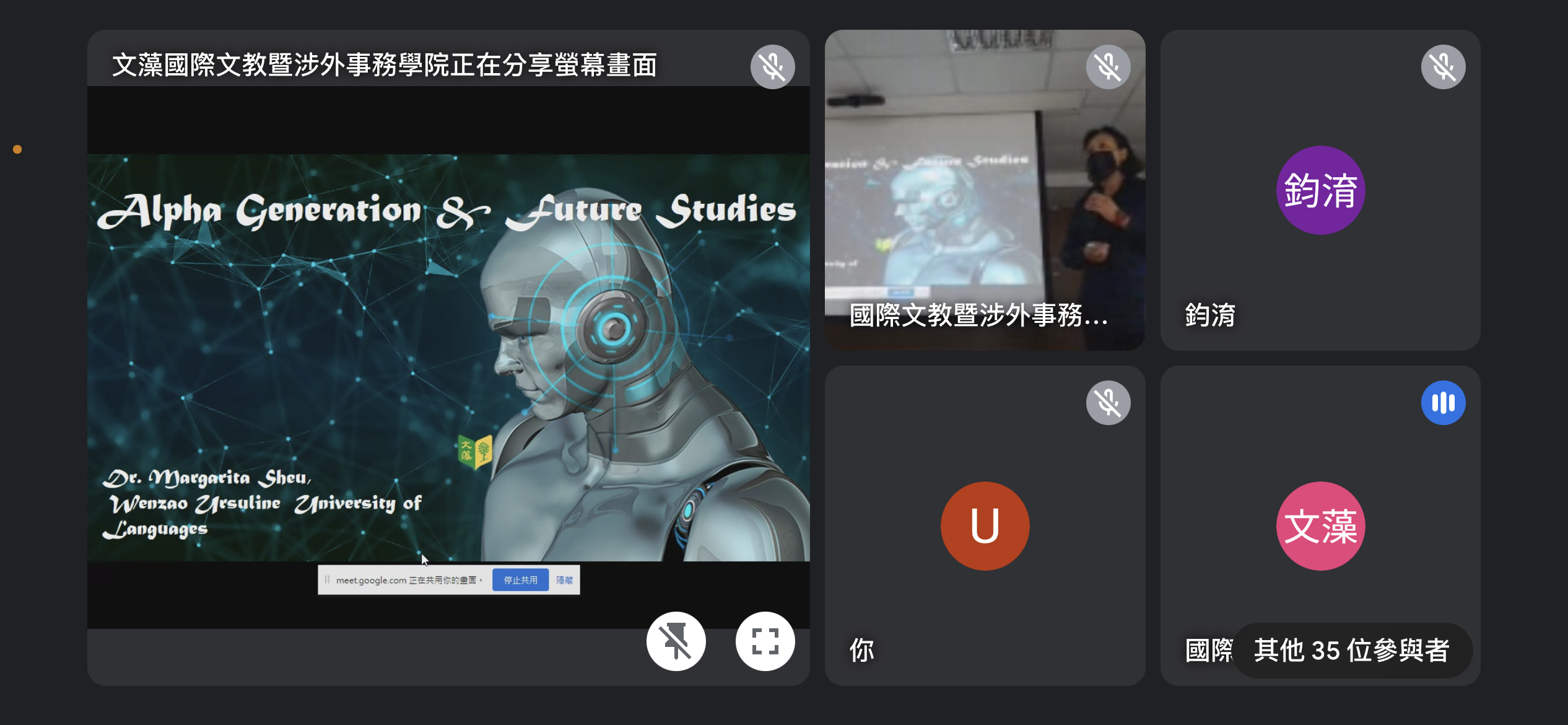Abstract
Wenzao Ursuline University of Languages
College of International Culture, Education and Foreign Affairs
I. Introduction
The Program on Bilingual Education for Students in College (hereinafter referred to as the BEST Program) supports the College of International Culture, Education and Foreign Affairs (hereinafter referred to as the College of ICEFA) with an increase on EMI courses, enabling the cultivation of more international cross-disciplinary talents. The College of ICEFA aims to achieve its goal from training students with English language skills as a profession to cultivating students’ professional skills through English. To draw on the 7 dimensions of the BEST Program, key highlights of the program are as follows.
II. KPIs of the BEST Program (7 dimensions)
A.Institutional strategy and management
The College of ICEFA adopts the following four actions:
- Establishing the Wenzao Bilingual Teaching Resources Centre: Wenzao Bilingual Teaching Resources Centre is established and supervised by the Vice President and established to direct, coordinate and manage the implementations within the University. Furthermore, the Resource Center, which is operated under the Office of Research and Development, conducts institutional research (IR) related to EMI to improve EMI teaching.
- Establishing a College-level EMI Course Evaluation Committee: An EMI Committee is set up by the College to direct and develop strategies for promoting and evaluating EMI courses and reviews student scholarships and teaching awards. The College of ICEFA also discusses EMI course-related issues in the College Affairs Committee, Curriculum Committee, and departmental meetings.
- Providing ESP courses: ESP courses are offered to help students transit to EMI courses. All students have the flexibility to take ESP, EAP, and/or EMI to fulfill the 24-credit hour requirement if they have reached the CEFR B2 level of English proficiency. A total of 42 ESP courses were offered by the Center of English Language Teaching in 2021/22. Students are leveled to take EGP/ESP/EAP/EMI based on their English proficiency level.
- Encouraging faculty to enhance their English proficiency: The College provides funds to the faculty, staff who provide proof of results from their English proficiency test with a CEFR B2 level score or above. 58.14% of the faculty and staff have met the CEFR B2.
B.Teachers and teaching
The College of ICEFA provides the teachers supports and incentives, taking the following three approaches.
- EMI online seminars and training workshops: A one-day teacher conference on EMI, two online workshops and a monthly teacher training were offered within the University itself. Furthermore, the University sought external collaborations, such as working with the British Council and Cambridge English to offer an online Certificate in EMI Skills. A total of 44 teachers have received certificates. Eleven teachers from our College served as teaching consultants at the Southern Resources Centre to train teachers from colleges and universities with a total of 427 teaching hours. In addition, five teachers are taking EMI course training from the Center.
- Incentives: The College of ICEFA fund faculty members to obtain a proof of CEFR C1 level (or above) certificates. The College also provide incentives for faculty members to teach EMI courses or design open courses in EMI. Currently two open courses and one e-learning course in EMI were offered. With a total amount of NT $478,840, a total of 67 instructors were funded.
- Faculty Communities:Six faculty communities (including EMI, ESP and international baccalaureate) were established by the College of ICEFA and its departments with four workshops were provided. A total of 107 teachers participated in one of these workshops. Two teachers applied for designing open courses. These sharing sessions allow instructors to have a deeper understanding about application of distance courses and MOOCs and developing online teaching materials. A total of two teachers submitted proposals for MOOCs application.
C.Students and learning
The College of ICEFA provides students with supports and awards through the following four actions.
- Language learning resources:The University’s Language Diagnostic and Consultation Center allows students to make appointments with 36 teachers for individual consultation and English tutors/buddies to practice their spoken English.
- Incentives: Students can be financially funded for taking and/or passing internationally recognized 4-skill English proficiency tests, Wenzao Teaching Through English (TTE) or obtaining internationally recognized professional certificates recognized by the departments. The College awards first-year students who complete EMI courses or who take internationally recognized 4-skill English proficiency tests. A total of 256 students were funded with a total of amount of NT$341,000.
- English proficiency tests: To examine the English proficiency of first-year students, all of them are expected to take the CSEPT before and after enrollment with the funding of the BEST. Among first-year students, a portion of 34.86% have demonstrated their English proficiency at the CEFR B2 level or above in the four skills.
- EMI courses: The College of ICEFA offers 181 face-to-face EMI courses and 3 online EMI courses (including MOOCs). 60.18% of second-year students and 83.87% of first-year graduate students have taken more than 20% of their credits in EMI courses. Among these students, 51.46% have demonstrated English proficiency at the CEFR B2 or above in their 4 skills. These results conform the KPIs set by the Ministry of Education.
D.Information to students and the public
The following four methods are adopted by the College of ICEFA for both external and internal promotion.
- The results of the BEST program have been published in major newspapers and magazines such as Global Views, Cheers Magazine, udn.com and Economic Daily News. A total of 9 pieces (click here).
- A BEST program website in bilingual was set up by the College to disseminate program information, which include the goals, EMI course lists, rewards, regulations, activity outcomes for all internal and external stakeholders. Two newsletters were released in English.
- A social media account on Instagram has been set up to announce program-related information.
- Regarding internal promotion, the College of ICEFA printed posters and held an online briefing in May in 2022, with a total of 83 faculty and students in attendance. Moreover, Wenzao held the 2022 Professional Development Conference for Faculty. The Vice President gave a talk on Bilingual Education Policy and planning, and invited departments to propose course planning. Over 330 teachers participated in the online Conference together.
E.Quality assurance
The following four approaches are adopted by the College of ICEFA.
- EMI teacher’s portfolio:A total of 72 EMI teachers have provided their teaching portfolio. which contains records of the teacher’s professional growth, handouts for the EMI courses, and samples of students' assignments.
- EMI course observation: The student assistants observed 12 teachers (17% of all EMI teachers) to analyze the proportion of English and Chinese and the time spent on class interaction. Peer reviews were also conducted to provide feedback to these 12 teachers.
- Teaching Evaluation: The College of ICEFA compared the teaching evaluation results of 102 EMI courses and 437 non-EMI courses in the 1st semester of the 110th academic year (with an average of 4.57 and 4.60 respectively). The results showed no significant difference, indicating that there is no difference in the quality of learning due to the language of instruction.
- EMI course satisfaction survey:A student survey from 91 EMI courses was conducted with a total of 1,255 responses. The average student course satisfaction rate was 4.3 out of 5-point Likert-type scale.
F.Sharing and Collaboration
The following three approaches are adopted by the College of ICEFA.
- Open-access courses:The University recognizes credits of taking open courses (65 Coursera courses) worldwide as self-access credit courses.
- Faculty community: Four meetings were hosted in the College of ICEFA’s EMI faculty community, with a total of 44 teachers from other universities participated in two online workshops.
- International collaboration: Five international scholars from England, Hong Kong, Argentina, the United States, and Italy were respectively invited by the Department of English, Department of International Affairs, and Department of Translation and Interpreting to conduct online collaborative teaching for 31 hours in total.
G.Other initiatives for enhancement
Wenzao conducted an EMI institutional research project to analyze both students’ course satisfaction and teacher needs. The results demonstrated that our students had a high level of satisfaction with EMI courses. The teaching content and pedagogy were highly correlated with the students' satisfaction and interest in the courses. Additionally, students' English proficiency did not affect their satisfaction with the EMI courses. University teachers expressed their desire for EMI training, especially in topics such as online and physical EMI teaching skills, cross-cultural understanding and inclusiveness.
III. Future Prospects
The College will continue to offer activities, including pre and post-tests, open courses, teacher community and study buddies. In 2022/23, the College will expand class observations to all EMI teachers and fund graduate students who plan to improve their academic research presentations and writings in English. EMI teaching workshops will continue to be hosted. All academic departments will plan their EMI strategies based on the university’s strategic plan and the needs of students and teachers.

